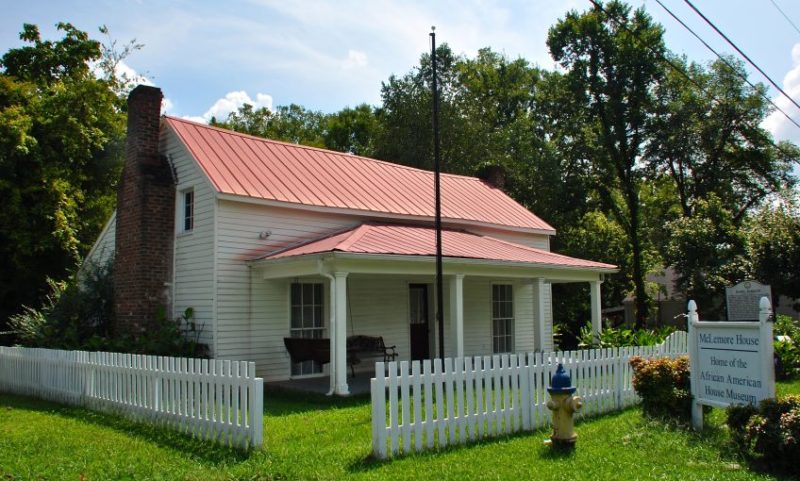If you live in Franklin, you’ve probably heard some reference to Hard Bargain, or the Hard Bargain neighborhood. This historic neighborhood adjoins Mt. Hope Cemetery on the south and sandwiched between 5th Avenue and 11th Avenue, bisected by Glass Street and Green Street, and Johnson Alley.
Hard Bargain is a traditionally African American community in Franklin, that developed on land bought by a former slave from his former master after the Civil War.
County records of the land show that the 15 acres that comprise the neighborhood was owned by Judge Perkins, who sold the parcel to W.S. McLemore in 1866. Harvey McLemore- W.S.’s slave- was emancipated after the Civil War.
After emancipation, Harvey McLemore worked on Carnton Plantation and other farms around Franklin in order to save money, wrote Rick Warwick, Williamson County Historian.
Working hard and saving his money, as per the advice of his former master, proved key to his success. In 1880, he bought four lots, totaling 15 acres, from W.S. McLemore, and built a home.
“He farmed it for about ten years and then he decided to subdivide it and sell off plots to other freed slaves,” said Brant Bousquet, Hard Bargain Association Executive Director. “So then, slowly people built houses, or just bought the land until they could afford to build, and then it became this little community of emancipated slaves. It was a very strong community of families, and people raised their children together. There were craftsmen, bricklayers, stonemasons, and domestics who worked and cleaned homes, blacksmiths, farming people, and a whole wide variety of folks in the community.”
The house that Harvey McLemore built, with his wife, Milly Abernathy, and their daughter, Mary, still stands- as the McLemore House- and is on the National Register of Historic Places.
As for the name Hard Bargain- colloquially the story goes that McLemore coined it after striking such a “hard bargain” with his former master for the property.
Warwick, however, recently found records showing its name may predate McLemore’s purchase.
The name goes back to Judge Perkin’s difficult time negotiating the sale price with Joel Parrish, brother-in-law of Abram Maury, who was the brother-in-law to Franklin’s founder and built a house on the hill overlooking the town, Warwick wrote.
“The Hard Bargain subdivision plat was registered on March 1, 1873, by Judge W.S. McLemore, a.k.a. Colonel W.S. McLemore 4th Tennessee Cavalry, CSA, which included 22 lots on 15 acres,” Warwick wrote.
“I will say that the African-American view of the name is that it came from Harvey McLemore’s dealings to buy the land,” Bousquet said.
Whatever the truth, the current and past residents take pride in the name, and the tale.
Today, 130 households comprise the Hard Bargain Neighborhood and the Hard Bargain Association strives to preserve the Hard Bargain neighborhood by rehabbing existing homes, building quality affordable housing, and enriching the lives of our neighbors.
“Everybody who lives here is proud of the name and proud of the neighborhood,” said Bousquet. With good reason. Many notable landmarks are- and people lived- in Hard Bargain.
Landmarks include, the black cemetery founded in 1884, the Franklin Primitive Baptist Church, founded in 1865, a Masonic Lodge organized in 1874, and other places no longer extant. A nightclub called La Paloma was located near where Sonic currently sits.
“It was basically like a night club, that mainly black patrons went to,” What was neat about it was that a lot of the major black entertainers came to Nashville to perform they would come either the night before or the night after to perform at La Paloma.”
Also, notable is the American Legion.
“When the African American men went off to fight in World War II, they fought side by side with whites, but when they came home it was too segregated Franklin. So the African American vets started their own American Legion,” Bousquet said.
Notable residents include Harry Marsh, Franklin’s last horse-driven cab driver; Lou Sharpe, Franklin’s fortune teller, Professor Willis Claiborne, a pioneer educator and Reverend William Scruggs, a local contractor, civil rights activist and the first black man to run for mayor of Franklin, in 1972.
Offers for you
Support our publication by shopping here

Coding for kids.
Introducing programming games for the next generation.
Learn more

Get a debit card for your kids, managed by you
Raise financially-smart kids with a card that lets you control how they use it.
Learn more
February 28, 2021 at 06:00PM
https://williamsonsource.com/black-history-month-the-hard-bargain-neighborhood/
Black History Month: Hard Bargain Neighborhood - Williamson Source
https://news.google.com/search?q=hard&hl=en-US&gl=US&ceid=US:en

No comments:
Post a Comment